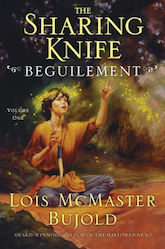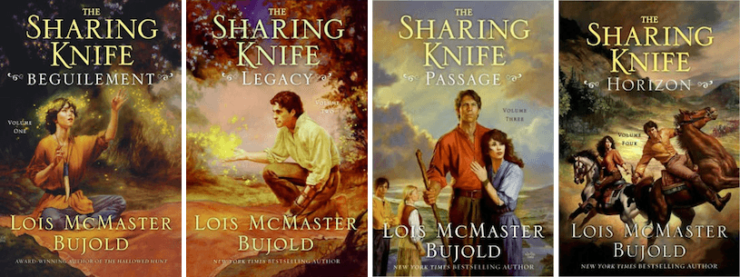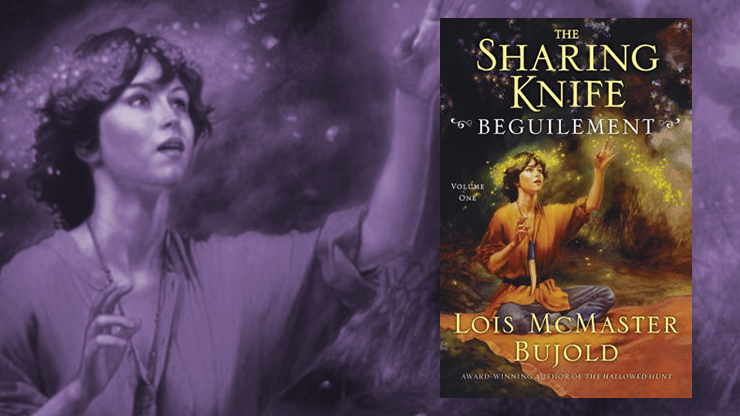In this bi-weekly series reviewing classic science fiction and fantasy books, Alan Brown looks at the front lines and frontiers of the field; books about soldiers and spacers, scientists and engineers, explorers and adventurers. Stories full of what Shakespeare used to refer to as “alarums and excursions”: battles, chases, clashes, and the stuff of excitement.
Today I’m taking a look at the work of one of my favorite authors of all time, Lois McMaster Bujold. Instead of the more widely known Vorkosigan series, or her Five Gods and Penric stories, however, I’ll be discussing the first book of her Sharing Knife series—a prime example of how romantic themes can fit well into a science fiction or fantasy setting. A few weeks ago, on Christmas Day, Bujold announced on her blog that “I am pleased to report that I have finished the first draft of a new novella in the world of The Sharing Knife. Functionally a novella, anyway; its length, at the moment, is a tad over 49,000 words, so it’s technically a short novel.” So, to get ready for the new story, let’s look back at the beginning with Book 1, The Beguilement.
As is fitting for an author of her stature and prominence, discussions of the work of Lois McMaster Bujold are quite common here on Tor.com. I have to admit that I am very jealous that fellow contributor Ellen Cheeseman-Meyer is overseeing the re-read of the Vorkosigan Saga, a job I wouldn’t mind having myself! And Liz Bourke, in her excellent Sleeps With Monsters column, has been covering the Penric novellas as they have been appearing. So I thought I would look at Bujold’s Sharing Knife series, which hasn’t gotten any sustained attention on Tor.com since Jo Walton looked at the first three books in one column, and then reviewed the fourth book. Walton’s analysis of the novels looks at the romance at the heart of the story, the influence of the American Midwest on the setting, and the way the themes both echo and contrast with the work of J. R. R. Tolkien.
Sometimes, when I re-read a book for this column, I find that my memory of a book is a bit better than the actual work, or that the book has become dated, with elements that are grating the second time around (Jo Walton has a good discussion of this phenomenon too, as it happens). The Sharing Knife: Beguilement was even better the second time, however—to the point where I have decided to pull the other three books off the shelf and catch up on them, too. It might seem surprising to some who read this column, which focuses mainly on stories containing lots of action and adventure, but I have always had a soft spot in my heart for a tale with a compelling romance in it. As a youngster so omnivorous and desperate for things to read that I’d even pore over the list of ingredients while I ate my breakfast cereal, I often picked up my mom’s magazines looking for stories. And back in those days, magazines like Redbook and McCall’s printed a lot of fiction, mostly romantic stories. My mother and I would often talk about which stories we liked and why we liked them. I grew to respect the ability of these authors to get the reader invested in the characters with only a few thousand words to work with, and I began to look at romantic subplots in the science fiction I read (often shuddering at how clumsy these subplots were, in comparison). At the time, it seemed to me that the ability to write science fiction and the skill to write romance might be mutually exclusive.
About the Author
Lois McMaster Bujold (born 1949) is one of the United States’ premiere science fiction and fantasy authors. She’s won four Hugo Awards for Best Novel—tied with Robert A. Heinlein for the most received by any author. She also holds a Hugo Award for Best Novella, and three Nebula Awards (one for Best Novella and two for Best Novel). She also won the first two annual Hugo Awards for Best Series for her Vorkosigan series and her World of the Five Gods series respectively. Of course, this covers just a few of the awards her work has received thus far in her career.
Bujold’s first fiction sale was in 1985, and she had completed three full novels before she eventually sold The Warrior’s Apprentice to Baen Books in 1986. All three were part of what’s now known as the Vorkosigan Saga. Being published by Baen, and because of the military themes in those initial three books, she was originally pigeonholed as a writer of military science fiction, but she soon proved extremely versatile. Bujold’s books often focus on biological issues and their impact on societies, including technology such as artificial wombs, genetic engineering, and cloning. When she began taking her hero Miles Vorkosigan in an entirely different direction in the midst of the series, it was clear that she had more in mind than just military adventures. The series has embraced and combined various genre elements over the years, including political intrigue, murder mysteries, psychological drama, espionage, romance, and even slapstick comedy. Her two fantasy series—the World of the Five Gods and the Sharing Knife series—bring a very unique and rigorous approach to worldbuilding, one which makes them accessible and appealing to science fiction as well as fantasy readers.
The Vorkosigan series, Bujold’s most popular work, has gone through multiple printings, and many of its books have been combined into omnibus editions. In recent years, Bujold has focused largely on shorter works distributed through electronic means, and her fiction continues to draw new readers in as her reputation continues to grow.
Romance and Science Fiction
In its infancy during the late 19th and early 20th centuries, the genre we now call “science fiction” was sometimes referred to as “scientific romance.” But this term used the word romance in its broader sense of a fictional work, not in its current usage as a work centering on romantic relationships. Today, while the field is uniformly referred to as science fiction, we still refer to older adventure stories set on habitable planets around our solar system as planetary romances.
Buy the Book


The Sharing Knife: Beguilement
Fantasy stories, especially those rooted in medieval tales of chivalry, have often had romantic plots or subplots. Science fiction, however, has arguably been more ambivalent about romance. While some science fiction authors have often featured romances as part of their stories (Stanley Weinbaum is an early example), there was a strong thread of classic SF that was anti-romantic. One example of this is the story “The Cold Equations” by Tom Godwin, where a pilot ejects a young female stowaway from an airlock, because sentiment cannot trump the laws of physics and survival.
Modern romantic fiction, which is generally said to have emerged as a separate genre in the American fiction market in the early 1970s, initially focused on contemporary and historical settings. As authors searched for ways to set their work apart, however, they began to reach out to other genres for inspiration. Popular subgenres of romantic fiction that cross over into the science fiction and fantasy genre include science fiction romance, fantasy romance, paranormal romance, and time-travel romance. Some of these works have gained wider popularity in recent years after being adapted into television shows, including the True Blood series by Charlaine Harris (an example of paranormal romance), and the Outlander series by Diana Gabaldon, an example of time-travel romance.
There is also a lot of science fiction and fantasy that would not be out of place on the shelf beside romantic fiction. As I have mentioned above, Lois McMaster Bujold’s work often involves romantic subplots, and in The Sharing Knife series, the romance itself provides the main plot. Another science fiction series that includes a number of books with explicitly romantic plots is Sharon Lee and Steve Miller’s Liaden novels (the first book of which I reviewed here). Of course, it’s not surprising that romance often figures into stories involving action and adventures—few characters go through adventures alone; in facing danger together, they tend to develop bonds, both romantic and platonic, that can last a lifetime
The Sharing Knife: Beguilement
Young Fawn Bluefield, a farm girl, is traveling alone to the nearby town of Glassforge. She has stopped at a farm to buy bread when a party of men approaches; fearing a gang of bandits, the woman of the house tells Fawn to hide in a tree. From her hiding place, Fawn sees a party of outdoorsmen, both male and female, and one of them, a man with a prosthetic arm, sits under her tree. She realizes they are Lakewalkers—mysterious wanderers who supposedly have magical powers. When they leave, she resumes her journey, not realizing that the man had known she was in the tree above him.
The Lakewalker, Dag, and his companion Saun are using a psionic power called “groundsense” to track a “malice,” a kind of malevolent monster who can create “mudmen,” or servants, to do its bidding. They find a camp of bandits, and when Saun is grievously injured, Dag uses his powers to prevent his friend from dying. When some of their opponents escape, Dag realizes there are mudmen among the bandits.
Fawn is captured by the escapees, and as she observes the mudman, realizes that something is terribly wrong. Dag, who had been pursuing them, catches up and frees her. She recognizes him and is surprised that he recognizes her—and even more surprised when he knows that she is carrying a child. This is the reason she is on the road; she was rejected by the boy who got her pregnant, and is too ashamed to admit her condition to her family. Dag explains the threat posed by malices and mudmen, and they find an abandoned farm where Dag leaves her so he can pursue the mudmen and find the malice. But the mudmen detected her pregnancy, which makes her attractive to the malice. It draws strength from the life of its victims, and can draw even more strength from a pregnant woman.
Seeing that Fawn has been captured, Dag charges into the malice’s lair to save her. As he fights the mudmen, he throws two bone knives to her and tells her to use them on the malice. She does, and when she stabs the malice with the second knife, the malice is destroyed. Fawn finds that the malice, in attempting to draw out her life, has killed her baby, and she is miscarrying. Fawn and Dag return to the abandoned farm to recover, and soon begin to bond. The two knives contain powers that are a Lakewalker secret. One of them is charged with a Lakewalker’s spirit; that is the one with which Fern killed the malice. The other knife is used by Lakewalkers to capture their spirit as they die—but this one has somehow captured the spirit of Fawn’s unborn child. How this has occurred is a mystery that Dag needs to unravel, and their shared experience, along with this puzzle, tie Fawn’s fate to Dag’s.
They find there is far more that draws them together. Fawn is bright, energetic, and full of questions. Dag is brave, older than Fawn, and wise, but tragedies in his past have caused him to become distant and cynical. In Dag, Fawn finds someone who, unlike her family, appreciates her for what she is and enjoys her enthusiasm. In Fawn, Dag finds someone who can bring joy into a life that has become cold. The cultures of the Farmers and Lakewalkers are very different, and their people are often hostile to each other, which adds a Romeo and Juliet aspect to their budding romance. We see the Farmers’ attitudes when the owners of the abandoned farm return, grateful to the Lakewalker, but wary at the same time. Then Dag and Fawn travel to Glassforge, where they move into a boarding house with a company of Lakewalkers, and Fawn learns more about his culture. Dag gets permission to take Fawn to their camp so the leaders can unravel the mystery of the charged sharing knife. To the chagrin of Dag’s fellow Lakewalkers, the relationship between Dag and Fawn becomes physical. On their way to the Lakewalker camp, Fawn and Dag stop at Fawn’s home so that she can tell her parents she is all right. They encounter both resistance and acceptance from the Farmer community, and things do not go the way they planned.
The setting in which this story unfolds, although it lacks guns and gunpowder, is very similar to the Midwestern United States in the early 19th century. I found this a refreshing change from the familiar quasi-medieval trappings of many fantasy narratives. The characters were very well drawn, and not only are their individual personalities believable and realistic, but their relationship fits those personalities well. The reader buys into the romance very quickly and begins rooting for the two star-crossed lovers. The two societies of Farmers and Lakewalkers, and the ways in which they clash, are fascinating. Bujold doesn’t simply present the setting and cultures she’s created in expository lumps—instead, we gradually learn more about Lakewalker culture through Fawn’s eyes, and about Farmer culture through Dag’s eyes, in a very natural manner. The malices and mudmen are forbidding antagonists, and lend the story a continuing sense of menace and excitement. The setting is post-apocalyptic, though the reader is not told whether the society that fell is our own modern society, now seen as magical by those looking back into a distant past, or some other unrelated human society. One of the strengths of the book is that Bujold resists the temptation to explain too much, and there is always another mystery awaiting around the corner.

Final Thoughts
The Sharing Knife: Beguilement is a delight from beginning to end. It works as both an adventure book and as a romance. The setting and worldbuilding are strong and clear, and presented in a way that doesn’t get in the way of the action. The main characters feel real and likeable, and their romance is compelling. My only complaint is that this is clearly not a volume intended to stand entirely on its own, reportedly because Bujold turned in a manuscript that proved too long for a single book.
And now I’d like to hear from you: What are your thoughts on this novel and its sequels? And what do you think of Bujold’s use of romantic themes in her other works? And can you recommend any other science fiction or fantasy books that portray similarly believable and satisfying romances?
Alan Brown has been a science fiction fan for over five decades, especially fiction that deals with science, military matters, exploration and adventure.










